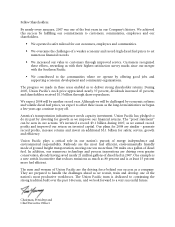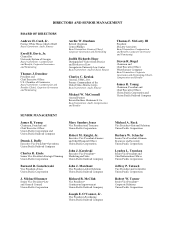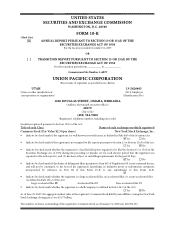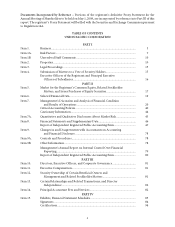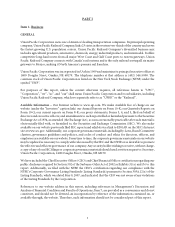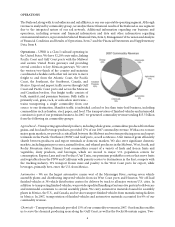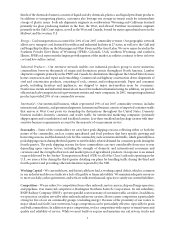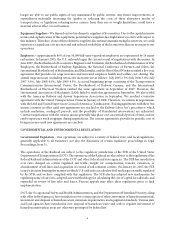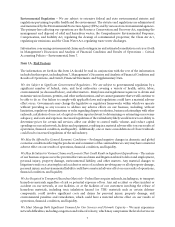Union Pacific 2007 Annual Report Download - page 13
Download and view the complete annual report
Please find page 13 of the 2007 Union Pacific annual report below. You can navigate through the pages in the report by either clicking on the pages listed below, or by using the keyword search tool below to find specific information within the annual report.9
and remediate known, unknown, or future environmental contamination, which could have a material
adverse effect on our results of operations, financial condition, and liquidity.
We May Be Affected by Climate Change and Market or Regulatory Responses to Climate Change – Climate
change, including the impact of global warming, could have a material adverse effect on our results of
operations, financial condition, and liquidity. Restrictions, caps, taxes, or other controls on emissions of
greenhouse gasses, including diesel exhaust, could significantly increase our operating costs. Restrictions on
emissions could also affect our customers that (a) use commodities that we carry to produce energy, (b) use
significant amounts of energy in producing or delivering the commodities we carry, or (c) manufacture or
produce goods that consume significant amounts of energy or burn fossil fuels, including chemical producers,
farmers and food producers, and automakers and other manufacturers. Significant cost increases, government
regulation, or changes of consumer preferences for goods or services relating to alternative sources of energy
or emissions reductions could materially affect the markets for the commodities we carry, which in turn could
have a material adverse effect on our results of operations, financial condition, and liquidity. Government
incentives encouraging the use of alternative sources of energy could also affect certain of our customers and
the markets for certain of the commodities we carry in an unpredictable manner that could alter our traffic
patterns, including, for example, the impacts of ethanol incentives on farming and ethanol producers. Finally,
we could face increased costs related to defending and resolving legal claims and other litigation related to
climate change and the alleged impact of our operations on climate change. Any of these factors, individually
or in operation with one or more of the other factors, or other unforeseen impacts of climate change could
reduce the amount of traffic we handle and have a material adverse effect on our results of operations,
financial condition, and liquidity.
Rising or Elevated Fuel Costs and Whether We Are Able to Mitigate These Costs with Fuel Surcharges Could
Materially and Adversely Affect Our Business – Fuel costs constitute a significant portion of our transportation
expenses. Diesel fuel prices are subject to dramatic fluctuations, and significant price increases could have a
material adverse effect on our operating results. Although we currently are able to recover a significant
amount of our increased fuel expenses through revenue from fuel surcharges, we cannot be certain that we will
always be able to mitigate rising or elevated fuel costs through surcharges. Future market conditions or
legislative or regulatory activities could adversely affect our ability to apply fuel surcharges or adequately
recover increased fuel costs through fuel surcharges. International, political, and economic circumstances
affect fuel prices and supplies. Weather can also affect fuel supplies and limit domestic refining capacity. If a
fuel supply shortage were to arise higher fuel prices could, despite our fuel surcharge programs, have a
material adverse effect on our results of operations, financial condition, and liquidity.
We Face Competition from Other Railroads and Other Transportation Providers – We face competition from
other railroads, motor carriers, ships, barges, and pipelines. In addition to price competition, we face
competition with respect to transit times and quality and reliability of service. While we must build or acquire
and maintain our rail system, trucks and barges are able to use public rights-of-way maintained by public
entities. Any future improvements or expenditures materially increasing the quality or reducing the cost of
alternative modes of transportation, or legislation releasing motor carriers from their size or weight
limitations, could have a material adverse effect on our results of operations, financial condition, and liquidity.
Additionally, any future consolidation of the rail industry could materially affect the competitive environment
in which we operate.
We Are Subject to Legislative, Regulatory, and Legal Developments Involving Taxes – Taxes are a significant part
of our expenses. We are subject to federal and state income, payroll, property, sales and use, fuel, and other
types of taxes. Any or all changes in tax rates, enactment of new tax laws, revisions of tax regulations, and
claims or litigation with taxing authorities could result in substantially higher taxes and, therefore, could have
a material adverse effect on our results of operations, financial condition, and liquidity.
We Utilize Capital Markets – We rely on the capital markets to provide some of our capital requirements,
including the issuance of long-term debt instruments and commercial paper from time to time, as well as the
sale of certain of our receivables. Significant instability of the capital markets or deterioration of our financial
condition due to internal or external factors could restrict or prohibit our access to commercial paper and


